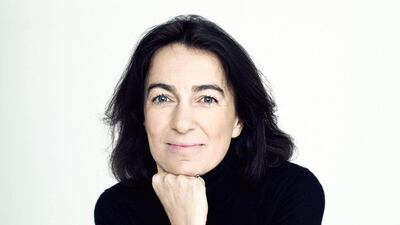In June, Palazzo Pucci, which has stood in the heart of Florence brushing shoulders with the Duomo and Michelangelo's David, and been home to the same family, since it was first constructed in the 13th century, reopened as the Emilio Pucci Heritage Hub.
Transformed by Italian architect Piero Lissoni, the space is meant to act as an incubator for the brand's DNA, linking its past, present and future. It is not a museum, exactly, for Florence already has plenty of those; it is, instead, "an archive for the future", complete with a digital library featuring a Samsung video wall and Pucci-print-ensconced armchairs, and a boutique offering everything from Pucci clothing to special projects such as skateboards and limited-edition Illy cups. To create this new narrative around a brand that can sometimes be accused of holding on too tightly to its past, Pucci brought in students from leading fashion schools to rifle through the archives and reinterpret their findings.
To inaugurate the “hub”, Pucci teamed up with mannequin producer and long-time collaborator Bonaveri to create an installation that celebrated Pucci’s history in a colourful, playful, relevant way. For four days during Pitti Uomo in June, the historic space was dotted with mannequins – some were covered in Pucci’s iconic Vivara print, which was inspired by the island of Ischia; others were clad in classic Pucci colours, as well as the brand’s bags, scarves, hats and jewellery. And in the Art Room, the mannequins adopted a more abstract aesthetic, to highlight some of the cornerstones of the Florentine fashion brand.
These examples are still in situ when I visit the palazzo a couple of months later. One mannequin is engulfed in tassels; another is seen emerging from an oyster shell, in a nod to the brand’s famous pearl bikini; some are fringed in ruffles or raffia; while one is covered in a zebra-print motif, with a braid extending from her head and wrapping sinuously around her body. It’s a reminder that while the brand may be known for its riotous colours and spectacular prints, there has always been a place for monochrome in the Pucci portfolio.
As if to prove the point, when Laudomia Pucci di Barsento strides in for our interview, she is dressed all in white. “Every brand has its forte and we are understood for our prints. But I could not be in print all the time,” she admits. “I use a lot of prints, but today I’m in solids and it’s Pucci. Our prints are often mixed with black and white. Starting with a piece of print and mixing it with solids that you feel comfortable with is always a good place to start.”
Laudomia took over the family business when her father, Emilio, passed away in 1992. Born in 1914, Marquis Emilio Pucci di Barsento was the embodiment of post-war Italian glamour. Born in Naples to one of Florence's oldest and most illustrious families, he was multilingual, well-travelled and America-educated, not to mention an air-force pilot and Olympic athlete. In 1947, he designed a ski outfit – for himself and his socialite friends – that was promptly snapped on the slopes of Zermatt in Switzerland by American fashion photographer Toni Frissell and featured in Harper's Bazaar.
Emilio’s first boutique was on the island of Capri, where he developed resort wear that reflected the island’s vibrant colours. He was heralded for liberating women – by creating clothes that gave them unprecedented freedom of movement. In the 1950s, he began experimenting with his now signature prints, drawing on everything from Sicilian mosaics, heraldic banners, Balinese batiks and African motifs.
Following her father’s death, Laudomia was tasked with continuing this legacy. She initially served as the company’s chief executive, until 2000, when she negotiated the sale of 67 per cent of the business to the LVMH Group. She now holds the roles of deputy chairperson and image director – and is acutely aware of the dangers of resting on one’s laurels, which, she admits, can be a “very Italian” trait.
“Italy has such an incredible history. Even our modern history... since the war, we’ve done extraordinary things. But I think we sometimes lack the energy we used to have in previous generations. Two generations ago, people were very brave; they reinvented many things; they reinvented the lifestyle, the Italian dolce vita, they created extraordinary companies that had vision.”
The challenge, now, is “adapting or readapting” that, says Laudomia. “I think what’s important is to be sufficiently innovative, clever, open, curious, and to think out of the box and understand things. Now we are talking about a generation that was born online; they will see and look at things differently to us. How will they relate to all this?”
One answer is the Emilio Pucci Heritage Hub. “The stories count more than ever,” she concludes.
______________________
Read more:
Watch: Model-of-the-moment Niko graces the cover of The National's Luxury magazine September issue
Jonathan Koon could be the most interesting man you've never heard of
Would you buy fine jewellery off the internet?
______________________


